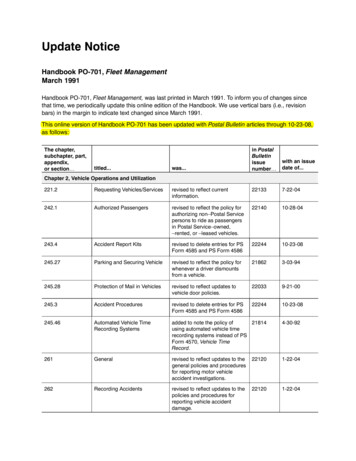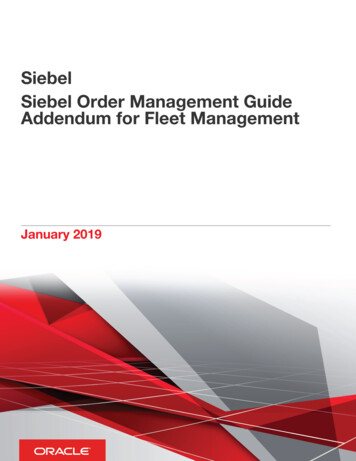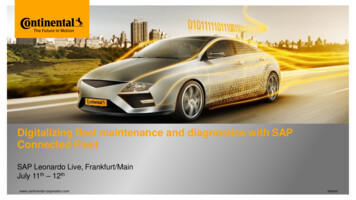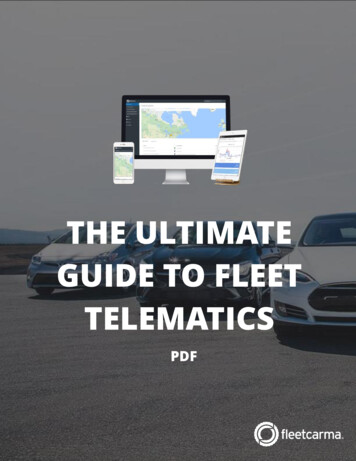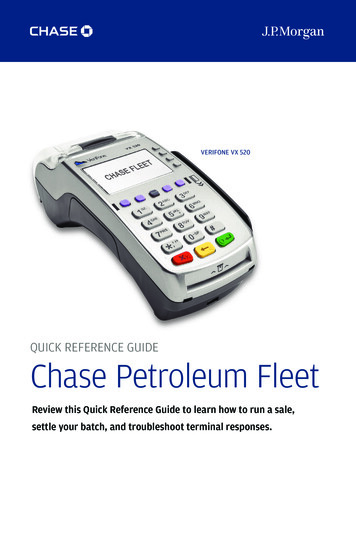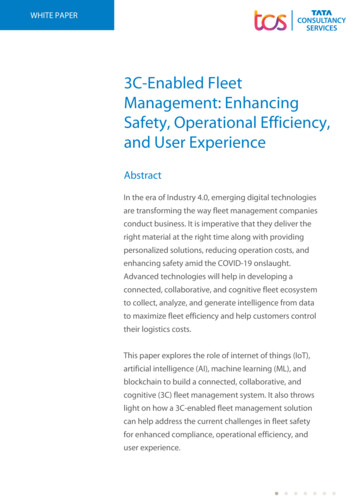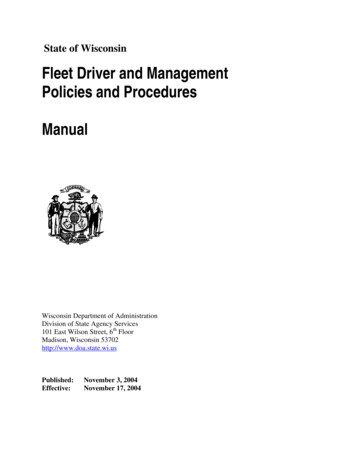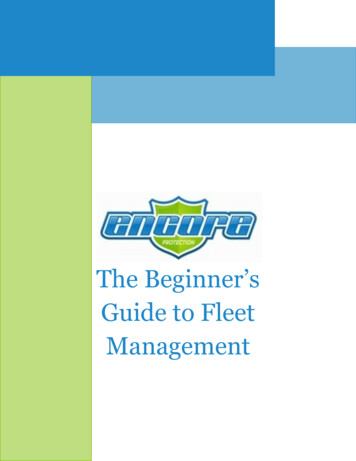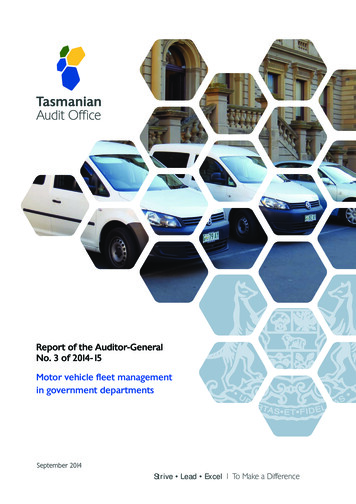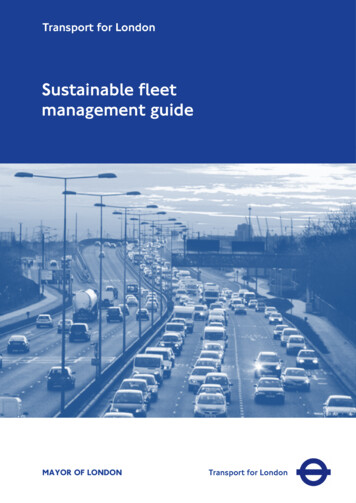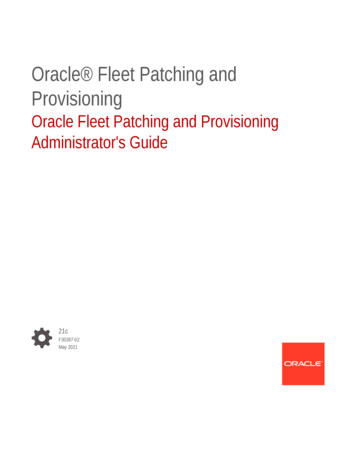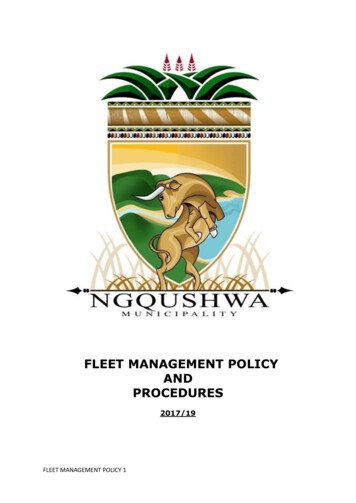
Transcription
FLEET MANAGEMENT POLICYANDPROCEDURES2017/19FLEET MANAGEMENT POLICY 1
SummaryPublication DateReview DateFebruary 2018RelatedLegislation/ApplicableSection of LegislationRelated Policies,Procedures, Guidelines,Standards, Frameworks Road Traffic Act 1996, RoadTransport Quality SystemReplaces/ Repeals(whichever is relevant, ifany)Policy Officer(Name/Position)Z MDABULAPolicy Officer (Phone)040 6733 097Policy Sponsor(Name/Position)FLEET OFFICERDepartment ResponsibleINFRASTRUCTUREDEVELOPMENT & TECHNICALSERVICESUnit responsibleFLEET MANAGEMENTApplies toAll NLM employees &councillorsKey WordsStatusREVIEWCouncil approval dateVersionFLEET MANAGEMENT POLICY 21
REVISION RECORDDateVersionFLEET MANAGEMENT POLICY 3Revision Description
CONTENTS1.TITLE . 52.PURPOSE . 53.SCOPE . 54.PROCEDURE DETAIL . 5-524.1. Subheading 1 .4.2. Subheading 2 .5.ROLES AND RESPONSIBILITIES . 33-346.MONITORING, EVALUATION AND REVIEW. 347.DEFINITIONS AND ABBREVIATIONS . 34-358.SUPPORTING DOCUMENTS . 349.REFERENCES. 35APPENDIX. 35FLEET MANAGEMENT POLICY 4
1. TITLEFLEET MANAGEMENT POLICY AND PROCEDURES2. PURPOSETo provide a rationalized Fleet achieving economics of scale andreduced repairs and maintenance charges for Ngqushwa LocalMunicipality.3. SCOPEThis policy applies to: All municipal employeesMunicipal council4. PROCEDURE DETAIL1. INTRODUCTION1.1 Mission Statement1.2 Core Function: Fleet Manager1.3 Roles & Responsibilities of:1.3.1Fleet Manager1.3.2Corporate Management1.3.3HOD’s1.3.4Vehicle Custodian/User/Driver1.3.5Municipal Manager2.INSTRUCTIONS TO VEHICLE 92.102.112.122.13The Council FleetResponsibility for Control of Vehicles UsageUse of Garaging of Council Vehicles at Private AddressesConveyance of Private Persons/Goods in Council VehiclesConveyance of Employees in Open VehiclesCompliance with Road Traffic Act & Other Related LawsVehicle Accident/Incident and ReportingCare and Security of VehiclesLicence to Drive Council VehicleObtaining Service and Repairs to Council VehicleRe-registration ResponsibilitiesFuel Purchase and AdministrationVehicle ReplacementFLEET MANAGEMENT POLICY 5
3.MOTOR VEHICLE SELECTION, ALLOCATION ANDACQUISITION3.13.23.33.4Vehicle Selection PolicyStandardization of Fleet Asset/Optimal Fleet SizeVehicle Acquisition ApprovalsPurchase and Disposal4.OPERATIONAL EQUIPMENT, ACCESSORIES AND COLOUR OFVEHICLES4.1 General Policy4.2 Transmission4.3 Air Conditioning4.4 Vehicles Colour5.USE OF PRIVATE VEHICLES5.1General Policy6.ADMINISTRATION6.16.26.3General PolicyFleet Tracking and Information stodian Responsibility8.INSURANCE, ACCIDENT REPORTING, DAMAGE ASSESSMENTAND REPAIR8.18.28.38.48.5Responsibility for Insuring Fleet VehiclesAccidents Involving Private VehiclesAccident Incident RepairsAccident ReviewsReport to Head: Council Fleet9.SERVICE AND MAINTENANCE9.1 General Policy9.2 preventative Maintenance, Routine Inspections and ServiceSchedules9.3 Authorizing Service and Repairs9.4 Individual Vehicle History Records9.5 Warranty ClaimsFLEET MANAGEMENT POLICY 6
9.69.7BreakdownsVehicle Body Repairs10.VEHICLE POOL10.1 General Policy 10.2 Use of Pool Vehicles10.3 Pool Vehicle Usage Records11.FUEL SUPPLIES11.1 Allocation and Usage of Petrol Cards11.2 Fuel Usage & Petrol Card Usage Report12.TAXIS AND RENTAL VEHICLES12.1 General Policy12.2 Authorization and monitoring13.PENAL AND GENERAL13.1 Penal13.2 General14.AMENDMENTS14.1 AMENDMENTS1.INTRODUCTIONThe Ngqushwa Local Municipality Fleet Management Policy shall provide theframework within which an efficient and effective management of fleet andrelated resources will be managed and utilized.A copy of this policy shall be kept and maintained in the office of each Headof Department. This policy shall also be made available and accessible toall vehicle, plant and equipment users and others responsible for it’s use,including administrative staff handling fleet matters.1.1Mission StatementTo provide a rationalized Fleet achieving economics of scale and reducedrepairs and maintenance charges for Ngqushwa Local Municipality.FLEET MANAGEMENT POLICY 7
1.2Core Function: Fleet ManagementTo ensure the provision of cost effective fleet administration to Councildepartments in support of service delivery.1.31.3.1Roles and Responsibilities are as follows:The Fleet Administrator:1.To ensure compliance of vehicles in terms of the RTA & RTQS(Road Traffic Act 1996, Road Transport Quality System);2.To ensure that there is adequate insurance cover for thetransport fleet in accordance with policy;3.The implementation of a Fleet Management System asindicated in this policy;4.To ensure that end users are satisfied with the level of serviceprovided;5.The management of any Maintenance Contracts, including therecommendation for authorization of all claims by any supplier/contractorfor repair costs that are outside of the conditions of any contract and whichare the cost responsibility of the Council;6.Ensuring that the fleet is maintained through means indicated in thispolicy and through routine inspections, in a sound operating condition at alltimes;7.Prepare specifications and receive quotations from dealers, andprocess these within Council’s Supply Chain Management Policy andProcedures;8.To validate work requirements and costs, before authority is given,for work to be carried out on servicing, repairs and modification to Councilsfleet;9.Provide budget estimates for vehicle replacements and fuel andmaintenance costs;10.Provide information for strategic and operational planningpurposes including the continuous evaluation of Council’s fleet inorder to formulate plans to improve the efficiency, effectiveness andFLEET MANAGEMENT POLICY 8
11.economy of fleet assets available to the Council in the short, mediumand long term;To ensure compliance with any Service Level Agreements(SLA’s) with any user Department;12.Training staff in the administration of the fleet managementpolicy and information system, and their various areas ofresponsibility;13.Identifying operational cost variances;14.To inform Executive Management of any action necessary toreduce fleet operating costs;15. Advise Executive Management when vehicles, plant or equipment isdue for appraisal for possible replacement;16.To receive approved capital expenditure information andinitiate action to replace retiring vehicles, plant andequipment.17.Responsible for arranging the washing, cleaning, maintenanceand safekeeping of any Council vehicle whilst it is not in use.18. To ensure that all HOD’s and vehicles custodians/users/ drivers areaware of their responsibilities;19. To ensure that this policy is issued to each employee to whoma vehicle, any plant or equipment is to be allocated or who isprovided with the temporary use thereof. Anacknowledgement of receipt is to be held in the personnelfiles.20. For the planning and co-ordination of the responsibilitiesContained in this policy;21.For the management and control of pool vehicles;22.For maintaining a comprehensive database containing detailsof vehicle licensing, COR/F, Drivers licenses, PDP’s, accidents,age of vehicles, plant and equipment etc;23. Providing of information relating to the rental of fleet assets inrespect of the extent and the cost involved, as required;24. The administration of accident/incidents in close liaison withthe HOD, driver concerned and the driver’s manager;FLEET MANAGEMENT POLICY 9
25.Providing regular reports on accidents/incidents andidentifying drivers to whom counselling, training or otheraction may be appropriate;26.Maintaining individual vehicle records for:i)ii)iii)iv)v)Service, repair, fuel and other costs;Odometer readings;Vehicle utilization;Tyre usage and replacement;Exception reports on matters such as:(a) Excess maintenance costs(b) Excess fuel costs(c)Advisory reports on vehicle servicing,renewal,(d) Budgeting needsregistration27.Responsible for the general supervision over the use oftransport services and for directing the attention of theManagement and/or Council to any unsatisfactorycircumstances that come to notice28.To ensure that all Council’s vehicles are maintained inaccordance with the manufacturers maintenance schedule andthat other repairs identified are attended to without delay,thus underlining the proper preservation of the Council’sassets;29.Responsible for administering the re-registration/licensing ofCouncil vehicles as per the Procedure for Licensing of Vehiclesannexed to this policy;30. To manage the maintenance of the fleet tracking andinformation system, which system shall be required to:i)ii)iii)iv)Record repair history detail and costs for each vehicle to assistin validating work requests and to identify excess variancesagainst established standards;Record the detail of fuel usage for each vehicle and identifyexcess variance against established standards and recommendappropriate remedial actionRecord monthly odometer readings for each vehicle andidentify vehicles that are due for service, registration andreplacement;Record the detail of days that a vehicle is not available forusage;FLEET MANAGEMENT POLICY 10
v)vi)vii)viii)Produce budgets for capital expenditure and operating costs;Provide reports to Executive Management on variances withadvice to what is expected to address the issue;Get targets for the disposal of retiring vehicles and identifythose units that, through lack of care or preparation, havefallen short of the retained value expectation;Record details of accidents/incidents so as to provide readyidentification, with other excess costs, those drivers thatthrough counselling, may contribute to a reduction in therunning costs of the fleet;31. Responsible to ensure that all appropriate vehicle licenses areRenewed as required by the Road Traffic Act;32. To determine whether a post-accident/incident repair inspectionshould be carried out before the vehicle is accepted back into the fleet;33. To aggressively pursue claims against the manufacturer for reimbursement of costs caused through the failure of a component apparentlydefective at manufacture, and against repairs for faulty workmanship;34. For the management and control of the centralized fleet pool, factorsto be taken into account including geographical factors, potential shareduse of assets and existing utilization statistics;35. To allocate a pool vehicle to a staff member on the authority of aHOD/delegated person;36. To keep the following pool vehicle usage records:i)To require the driver of a pool to record the condition of the vehicleas it leaves the pool location;ii)To record the precise time, date, and the odometer reading at thetime the vehicle is issued;iii)To record the precise time, date, odometer reading and condition ofthe vehicle at the time the vehicle is returned to the pool location;iv)To record any further relevant information as he deems to benecessary;37. To recommend for approval, to the Executive Manager: CorporateServices, the use of rental vehicles when pool vehicles are otherwise notavailable;38. To ensure that the fleet is properly registered and insured atall times;39. To produce, for the use of Executive Management, separatereports as required, to include the following:FLEET MANAGEMENT POLICY 11
i)ii)iii)iv)40.Monthly Fleet Report providing full detail of the cost of running theCouncil’s fleet (fuel and maintenance and repair costs); and theusers;Exception Report indicating any action to be taken on variancesidentified;Vehicles overdue for service or re-registration renewal;Replacement Report;To advise the relevant department relating to a replacementvehicle in circumstances in which a vehicle is off the road forlonger than anticipated owing to additional repair or maintenancework to be undertaken on the vehicle allocated to it;41. To issue to each user department sufficient handbooks for drivers,such handbooks to detail the responsibilities of the driver are in so far asthe vehicle allocated;42. To provide a pool vehicle facility for the user department wherecasual users can have access to vehicles should they require one;43. To inspect all vehicles, plant and equipment at any time, but atleast once per week;1.3.2Executive Management1. To ensure that the Fleet Administrator, HOD’s, vehicle custodians, andusers adhere to the policy and instructions detailed herein or anyamendment hereto;2. Assist the Fleet Administrator when requiredresponsibilities and monitor his performance;withanyofhis3. To periodically review all authorized vehicles (and plant and equipment)forming part of the fleet;4. Determine, for consideration by Council, plant hire rates;5. To establish efficient and economic administrative routines thatadequately meet the management requirements for the fleet.Fundamental to this objective is to ensure that only once complete setof fleet information records are maintained which will be under thecontrol of the Fleet Administrator’s HOD;6. To receive and consider reports from the Fleet Administrator containing,at least, the following information;FLEET MANAGEMENT POLICY 12
i)Monthly Fleet Report providing full detail of the cost ofrunning the Council’s fleet (fuel and maintenance and repaircosts); and the users;Exception Report indicating any action to be taken onvariances identified;Vehicles overdue for service or re-registration renewal;Replacement Report;ii)iii)iv)v)To work with the Fleet Administrator/HOD’s to ensure theCouncil fleet is maintained in an operationally safe andefficient condition at all times and at a minimum cost;vi)Administer any fuel contracts, including authorizing theissuance of petrol cards and monitoring their usage.vii)Maintain record of driving license details for each staffmember requiring the allocation of a Council vehicleeither on permanent allocation or temporary use of a poolvehicle.viii)Provide budget estimates for vehicle replacements andfuel maintenance enforcement of policies including standing instructionsand procedures in respect of Fleet Management and theregular review thereafter.x)To determine utilisation benchmarks of fleet assetsagainst corporate norms and standards (benchmarks) asdetermined from time to time. Negative deviations areto be reported, followed-up and corrected on acontinuous basis byxi)To withdraw fleet assets from service when theyapproach the end of their functional life and totransfer/replace and/or scrap the fleet asset concernedto the best advantage of the fleet user and the Council.xii)To establish efficient and economic administrativeroutines that adequately meet the managementrequirements for the fleet. Fundamental to this objectiveis to ensure that only one complete set of fleetinformation records are maintained which will be underthe control of the Fleet Manager/Administrator’s HOD;xiii)To receive and consider reports from the FleetFLEET MANAGEMENT POLICY 13
Administrator containing, at least, the followinginformation:i)ii)iii)iv)xiv)1.3.3Monthly report providing full detail of the cost ofrunning the fleet;Exception report indicating the action to be takenon variances identified;Vehicles overdue for service or re-registrationrenewalReplacement reportTo decide on the purchase or sale of a fleet assetto theadvantage of the Council under circumstancesdeemednecessary by this department.The Vehicle Custodian/User/DriverNote: The Vehicle Custodian/User/Driver is the person to whom a Councilvehicle has been allocated for permanent or temporary use or the Managerupon whom responsibility rests for the control over the safekeeping ofCouncil vehicle/s when such vehicle is not in use.1. Responsible for the care, security and preservation of the Councilvehicle/s, whilst such vehicle is assigned/allocated to him;2. Accountable for the determination of their needs (size and composition)of the fleet in respect of the desirability, affordability, operation andutilisation thereof to provide the level of service delivery as required bythe Municipality;3. To ensure that the vehicle allocated/assigned to him or to be usedby him is fully roadworthy and functional;4. Not permitted to utilise Council vehicle to travel to his place ofresidence without authority of his Departmental Head;5. Responsible for ensuring that he is in possession of all necessaryauthorization documentation (trip authority) prior to his use of anyvehicle allocated to him;6. Responsible for reporting any damage caused to any vehicleallocated/assigned to him for whatsoever cause and for correctlyreporting any accident he or the vehicle is involved in, to theappropriate HOD and relevant Authority (SAPS);FLEET MANAGEMENT POLICY 14
7. Are collectively responsible for the proper use, care and condition ofCouncil vehicles which extends to the maintenance androadworthiness of each vehicle.8. Shall ensure that the fleet assets in their possession or under theircontrol are utilized to it’s full potential and for the purpose for whichthey were acquired;9. Shall ensure that fleet assets are operated in terms of any formalpolicy regulating the conduct of drivers and operators;10. Are required to comply with all laws of the road andparking restrictions;11. Are responsible for any traffic or parking infringements;12. Are responsible for compliance with section 2.7 of this policy init’s entirety and Annexure K (vehicle accidents/incidents andreporting).13. Is responsible for compliance with section 2.8 of this policyunless where otherwise stated (care and security of vehicles).14.Is responsible for compliance with section 2.9 of thispolicy in it’s entirety (license to drive Council vehicles).15.Is to ensure that the vehicle that they are driving is, atall times, properly registered (licensed) as the driving of anunlicensed vehicle is an infringement of the law for which thedriver will be held responsible. See also section 7.2.1 of thispolicy;16. Is to be aware of and comply with section 9 of this policy unless whereotherwise stated. (Service and Maintenance). See section 9.2.2 andAnnexure E for a checklist of essential items;17. Are to ensure that they are in possession of the appropriate fuel cardfor the refuelling of vehicles if they are to travel distances which arefurther than the tank range of the vehicle to be used by him/her;18. Is responsible for checking that tyres are inflated to thespecified tyre pressure;FLEET MANAGEMENT POLICY 15
1.3.4Head of Department/Delegated Person1. Shall be responsible for the misuse and/or abuse of fleet assets utilizedby their departmental staff;2. Is to advise the Fleet Administrator to renew vehicle licenses and doesnot mitigate the responsibility of each custodian to ensure that anunlicensed vehicle is not driven;3. To ensure compliance with the provisions of section 8.3(Accident/Incident Repairs) of this policy in so far as these apply toHOD’s;4. Will authorize the Fleet Administrator to allocate a pool vehicle to astaff member as and when required;5. Will advise Executive Management on a quarterly basis of all trafficviolations issued in respect of each allocated vehicle to theirdepartmental usage;6. Will ensure that vehicles under their control are available for servicingwhen the service becomes due;7. Shall provide the Fleet Administrator with a schedule showing thevarious drivers in their department and the license type/code whichthey are eligible to drive, including any Professional Driving Permits;8. Shall be responsible for any disciplinary matters that are attributed toany driver within their department;9. Shall be responsible for renewing of any Professional Driving Permits inrespect of drivers within their departments;10. Shall ensure that all drivers within their department are fully trainedand licenced to operate/drive a Council vehicle;11. Shall ensure that accidents are reported to the appropriateauthorities within 48 hours and that any investigations required arecarried out expeditiously;12. Shall be responsible for the allocation/utilization of vehicles withintheir department and the related administration processes;13.To investigate any unexplained breakdowns asFLEET MANAGEMENT POLICY 16
envisaged in Section 9.6 in conjunction with the Fleet Administrator.1.3.5Municipal ManagerThe Municipal Manager is the vehicle licensing proxy for the NgqushwaLocal Municipality and will be responsible for the appointment of vehiclelicensing representatives.2.INSTRUCTIONS TO VEHICLE CUSTODIANS/USERS/DRIVERS2.1The Council Fleet2.1.1 Council vehicles are provided to certain employees in order thatthey may better perform their duties, generally referred to as tool oftrade vehicles.2.1.2 The availability of fleet assets owned shall be optimized on a regularbasis. Fleet Management endeavours to maintain the fleet in aneffective, efficient and economic manner over its economic useful life and,if circumstances warrant it, arrange for the renting of a substitute tomaximise the availability to the user department.2.2Responsibility for Control of vehicle usage2.2.1 Managers and vehicle custodians have a collective responsibility forthe proper use, care and condition of Council vehicles. This responsibilityextends to the maintenance and roadworthiness of each vehicle.2.2.2 Utilisation by User Departments1. Fleet user shall ensure that fleet assets in their possession orunder their control are utilized to its potential and for thepurpose for which they had been obtained.2. Fleet assets shall further be operated in terms of a formal policywhich regulates the conduct of drivers and operators;2.3. Use and Garaging of Council Vehicles at Private Addresses2.3.12.3.2Council vehicles shall normally be garaged at the MainOffices.An employee, who has been allocated a Council vehicle forhis/her use may apply for permission to garage the vehicleat his/her private address, provided he/she canaccommodate it within the cartilage of the property andonly under the following conditions:FLEET MANAGEMENT POLICY 17
1. When he/she is on 24 hour call; or2. When he/she is required to work weekends, holidays oroutside normal working hours; or3. When the distance from his/her home to the work site isless than the distance from the office to the work site2.3.3In cases when standby duties necessitate an employeebeing allocated a vehicle overnight in order to perform thisfunction, any waiving of the garaging requirements mustbe authorized by the relevant Head of Department.2.3.4In all cases, application in writing should be made by therelevant Supervisor/Manager to the HOD concerned forauthority to garage the vehicle at the employee’s home.Any queries to the required procedures should be referredto Fleet Administrator.2.3.5The time spent travelling to and from work and home inCouncil vehicles on normal working days, does NOT formpart of the working day and would generally not qualify forovertime payment outside normal working hours.2.4Conveyance of Private Persons/Goods in CouncilVehicles2.4.1No person other than Municipal employees in the course ofthe business of the Council may normally be conveyed inCouncil vehicles. If in doubt as to whether the purpose ofthe trip will be regarded as official business, clarification isto be sought beforehand.2.4.2If the trip cannot be so regarded, the HOD may, in his/herdiscretion, approve the trip. Provided the necessaryindemnity and waiver forms protecting the Council fromany claim for injury or damage which may be suffered byprivate passengers, have been completed.2.4.3Private goods with the exclusion of personal effects maynot be transported in Council/hired vehicles, even wherethe vehicle does not deviate from its intended route.Private property carried in a Council/hired vehicle shouldbe restricted to the personal effects which may be neededby the occupants during the course of the day on which thetrip is made, e.g raincoats and reasonable refreshments forthe day.FLEET MANAGEMENT POLICY 18
2.4.42.5In the event of it being established that Council vehicleshave been used for reasons other than theaforementioned, the cost of lost time and transport willbecome surchargeable and will result in disciplinary action.Conveyance of Employees in Open Vehicles2.5.1The relevant regulation regarding the carrying ofpassengers in goods vehicles, now applies to all personsbeing carried in goods vehicles, whether in the course oftheir employment or not, except for persons being carriedfor the purpose of refuse removal.2.5.2The definition of a goods vehicle is a motor vehicledesigned or adapted for the conveyance of moveableproperty on a public road, and included a mechanicalhorse.2.5.3The portion of the vehicle in which such a person is carriedmust be enclosed with suitable material of at least 350mmabove the surface upon which person is seated (if suchperson is seated) and at least 1250mm above the surfaceof which such person is standing (if person is standing).2.5.4Furthermore, no person shall drive a goods vehicle whilepassengers are being conveyed in the goods compartmentthereof at a speed exceeding 80 km/h (subject toprevailing speed limits).2.5.5It is the responsibility of the driver of the vehicle to ensurethat his/her passengers are confined to the safety of thevehicles and, when the height of the enclosed area islimited to 350mm (seated passengers), he/she mustinstruct them to remain seated while the vehicle is inmotion.2.62.6.12.6.22.6.3Compliance with Road Traffic Act and Other relatedLawsDrivers/Users of all Council vehicles are required to complywith all laws of the roads and parking restrictions.Under no circumstances will the Council be responsible fortraffic or parking infringements.Where infringement notices are received, the Council willrequire the offending driver to immediately pay the fullamount to the relevant issuing authority.FLEET MANAGEMENT POLICY 19
2.6.42.7When required, the Council will make available to theauthorities the detail of the staff member last known to bein possession of the Council vehicle at the time of theoffence occurring.Vehicle Accidents/Incidents and Reporting2.7.1An accident to a Council vehicle and/damage to some otherproperty caused by the Council vehicle, no matter howslight shall be reported through existing structures.2.7.2All Council drivers are required to comply with the lawsrelating to reporting accidents/incidents to the SouthAfrican Police Services (SAPS).2.7.3Under no circumstances in responsibility for theaccident/incident to be admitted.2.7.4Drivers are to report the accident/incident to the FleetManager/Administrator and their HOD by the fastest meansand as early as possible after the accident/incident.2.7.5Where drivers receive notice that the SAPS is to proceedagainst them as the consequences of the accident/incident,the details are to be provided to the Fleet Administratorand their HOD.2.7.6Every accident/incident report requires the driverconcerned to complete an accident/incident report form.The Fleet Administrator on receiving this report maydetermine to review the accident/incident with the driverinvolved and the driver’s Manager. The findings of thisreview are to be passed to the relevant HOD.2.7.7The Council’s stance with regard to accidents/incidents isas follows:a) When the vehicle is being used on Council business, theCouncil pays;b) Where the use of intoxicating liquor or narcotic drugs isproven by South African Police Services (SAPS), thedriver pays;c) Where a person other than a Council staff memberdrives the vehicle, the vehicle custodian is responsible.FLEET MANAGEMENT POLICY 20
2.82.8.1The Fleet Administrator’s responsibility is to ensure that allCouncil vehicles are maintained in accordance withmanufacturer’s maintenance schedules and that otherrepairs identified are attended to without delay.Underlying this requirement is the proper preservation ofthe Council’s assets: which shall be further ensuredthrough routine checks of all fleet.2.8.2Custodians are responsible for the cleanliness and washingof vehicles.2.8.3Where vehicles are fitted with fire extinguishers, driversare to familiarize themselves with the proper use thereof.2.8.4It is the responsibility of each vehicle custodian to ensurethat vehicles are properly secured at all times. Wherealarms are fitted or steering/gear locking bars provided,they are to be put to proper use when the vehicle is leftunattended.2.8.5As part of the requirement to preserve the Council asset itis expected that all vehicles will be stored in under-covergarages/carports overnight, where such structures areprovided.2.92.9.12.9.2Care and Security of VehiclesLicence to Drive VehiclesLicence to drive any vehicle is controlled by legislation ineach South African Province and only drivers in possessionof a full valid licence issued by one of the Authorities ispermitted to drive a Council motor vehicle.All employees who are called upon or required by virtue of theirdesignation (job) to drive a Municipal vehicle
FLEET MANAGEMENT POLICY 5 1. TITLE FLEET MANAGEMENT POLICY AND PROCEDURES 2. PURPOSE To provide a rationalized Fleet achieving economics of scale and reduced repairs and maintenance charges for Ngqushwa Local Municipality. 3. SCOPE This policy applies to:- All munic
